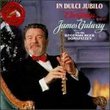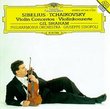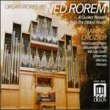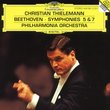| All Artists: Mahler, Bernard Haitink, Chicago Symphony Orchestra Title: Mahler: Symphony No. 6 Members Wishing: 0 Total Copies: 0 Label: CSO Resound Release Date: 4/8/2008 Genre: Classical Style: Symphonies Number of Discs: 2 SwapaCD Credits: 2 UPC: 810449018043 |
Search - Mahler, Bernard Haitink, Chicago Symphony Orchestra :: Mahler: Symphony No. 6
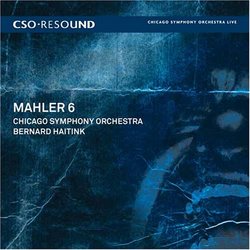 | Mahler, Bernard Haitink, Chicago Symphony Orchestra Mahler: Symphony No. 6 Genre: Classical
|
Larger Image |
CD DetailsSimilarly Requested CDs
|
CD ReviewsPlayed well, but Haitink is excrutiatingly slow and dull B. Guerrero | 04/09/2008 (3 out of 5 stars) "Sheesh, folks - it gives me absolutely no joy to be so negative about this release. I was hoping for this to be an improvement over Haitink's CSO Mahler 3rd, which ain't bad (not great, either), but this is even more disappointing. It makes me wish now that I had never said anything nasty about his recent French one for the Naive label (L'Orchestre National de France). That one was positively thrilling compared to this snooze-fest. For starters, this is among the very slowest versions of the Mahler 6th symphony ever recorded (Sinopoli has the slowest one on record). But it possess none of the sleezy decadence that made the Sinopoli M6 sort of interesting (way too slow in the andante movement, though), much less the steely resolve and grim determination of the old John Barbirolli one. Haitink is just grim . . . and dour. Surely the CSO could have held off for some fresh blood to offer a few new or interesting insights. I just don't find anything new or interesting here at all. Let's begin on the gruesome details. I have no problem with any conductor starting M6 with such a slow march, especially when you have low strings that are as strong as those in Chicago. But that also means that you have to conjure up some degree of contrast when you reach the sweeping second subject; the so-called "Alma theme". Haitink boldly fails to go where a few men have, indeed, gone. He's just slow and trudgy from start to finish - well over 25 minutes worth! I could have forgiven all that if he had simply whipped up some genuine excitement at the close of the movement. But just as with several spots in his recent CSO M3, he gets a lot of loudness from the famous Chicago brass, but with insufficient forward motion or sense of enthusiasm to go along with it. All this makes me think that Barbirolli made the right call by leaving out the exposition repeat. If you think that tragic means dark, heavy, and slow - from start to finish, mind you - your ship has arrived. Scherzo: why bother? I think this performance is a good argument for dropping the scherzo altogether - thus ending the never ending debate over movement order, once and for all - and turning Mahler 6 into the greatest three movement symphony every written. Seriously, this is about as dull and poker-faced as you'll ever hear this oh-so-spooky scherzo. It's very well played, and little more. If you want to hear what this scherzo can - and should - contribute to the overall narrative of the symphony, try Rattle (either one); Gergiev/LSO (just came out too); Neumann/Czech Phil. (Canyon Classics), or Macal/Czech Phil. (Exton). Even Sinopoli provided some interesting contrast with his Mahler 6 sludge-fest, just by taking the scherzo at a relatively quick tempo. Andante Moderato: Haitink isn't ridiculously slow with this - well less than 17 minutes, actually. But it might as well have been 19 minutes. Again, the playing is there but not much else. For example, there's absolutely nothing graphic or outdoors-y about the brief "Alpine" passage, located about six minutes in, under Haitink's dreary direction (rising, unsion horns; on-stage cowbells; naive sounding solo trumpet; swirling violin trills) - how could it all have fallen so flat? On the plus side, the Chicago strings do themselves proud over the movement's climactic passage. But it's all too little, too late. What's all the romantic fuss about? Finale: from bad to worse. For example, let's just take the slow introductory section. There's a brief, funeral dirge for low woodwinds, followed by the low brass, that's located no more than 90 seconds into the movement. Haitink takes this at an extremely slow tempo, but then fails to make a ritard at the one spot where he could have inserted a huge one to great effect: the last A-major to A-minor chord meltdown, just before the movement begins its first allegro (fast) episode. Haitink also fails to build up the tempo while traversing the chromatic (half step) harmonies leading up to the first hammer blow - which, by the way, is rather underwhelming in comparison to all the loud brass surrounding it - or approach the second one with much sense of trepidation, for that matter. Both Gergiev and Tennstedt (1991) are far better at objectifying the differences between the two hammer-strokes, just by the way that they approach them. As for the hammer-strokes themselves, I'm more bothered by the balances at those critical junctures, than by the slightly underwhelming sound of the hammer itself (the second one gets reinforced by the optional, additional percussion). The famous Chicago brass dominate at those big junctures, just as they should, but to the extent that the brass sound as though they're sitting in the front row along with everyone else. No doubt, that kind of effect is a byproduct of Mr. Mallison's recording technique (very wide sounding), along with the relatively shallow depth of Chicago's Orchestra Hall. As so often happens, the strong Chicago trumpets make little or no distinction across the various gradations of forte - it's all just equally loud. Again, that's probably more an issue of logistics and acoustics, than any negligence on their part. I just don't like it when the trumpets sound front and center - literally! Perhaps a better solution would have been to put the horns where the trumpets normally are (front and center, but along the back), and put the trumpets more off to the side. Well, why go on? I could point out that Haitink interestingly makes a huge ritard for the brief "false victory parade" passage, located before the spot where the third hammer-stroke originally existed (and sometimes gets reinserted) - and gets his horns to blast a true fortissimo there too - but then fails to bring out the all-important percussion underneath the horns and sweeping violins. But what would be the point? The battle is over, and so am I. If you want the big guns of an American orchestra in Mahler 6, I would strongly recommend sticking to the recent Eschenbach/Philly one on Ondine. While Eschenbach may not be perfect either, he's vastly more varied and interesting with his conducting than Haitink. The balances are also far, far better than here. And while I'm not a huge fan of Tilson-Thomas' Mahler in general (his 8th should be great), his sixth is much better too. It's also a shame that DG never remastered and reissued their Abbado/CSO M6 on to their fine "Originals" series, because it's really pretty good - much better than this. As for Haitink, his best Mahler 6 is still the very first one he made with the Concertgebouw. His Berlin remake was pretty dull in the first two movements, but the slow movement and finale were darn near excellent - much, much, much better than this. Even his French one had its moments. Perhaps these would have appeared to have been great performances in a "live" situation (albeit loud), but something simply isn't translating on to disc. Instead, I wish that the well meaning folks at the CSO had waited for someone new to get a crack at it. In my opinion, this is a wasted effort for the CSO. And I take no pleasure in saying that. " Wish I'd gotten the SACD! A. Craig | Grand Junction,CO | 11/04/2008 (5 out of 5 stars) "This recording of Mahler's Symphony no. 6 in a, is one of the finest on disc. Bernard Haitink, who does not need to renew his Mahler credentials shows us a performance of this work that is quite special from the get go. The members of the Chicago Symphony Orchestra prove themselves more than able to deal with what Mr Haitink asks of them. Some people I have talked to look at the running time of this set and wonder if it sounds too slow in performance, I don't think so. What you hear is the music being allowed to unfold at a rate that sounds just right, not too slow, not too rushed. Most performances sound as if the performers want to get the work over with in a hurry. The sound on this recording is really quite good. I only wish that the other work on the concert counld have been included as a filler on the second disc, which was Wagner's "Siegfried Idyll" another magical performance. Haitink and the CSO do not miss a beat anywhere. This is a clear first choice!" Gorgeously played, but a neutral interpretation Santa Fe Listener | Santa Fe, NM USA | 08/30/2008 (3 out of 5 stars) "This is Bernard Haitink's fourth recording of the Mahler Sixth, and as in the two earlier versions I know, he proves to be the anti-Bernstein. His interpretation is neutral and straightforward, and his greatest strengths are those of balance, care, detail, and sonority. I have always found Szell's Sixth from Cleveland too stiff, so it must be granted that Haitink doesn't put the music in a neck brace, as Szell does. That said, there's more nuance and flexibility in great Mahler performances, not to mention tension and drama, than Haitink finds here.
If you want a relaxed reading in great sound, however, and stupendously executed, this live one from Chicago is nearly ideal. Haitink communicates his mastery best when you hear him in the concert hall, and being present for this concert was no doubt an overwhelming experience. But the volcanic virtuosity of the Chicagoans gets flattned out when reduced to the scale of two loudspeakers in a small living room. One is left concentrating on Haitink's lack of drama. As for how each movement goes, there's not much to relate. The opening proceeds at a uniform, moderate pace, with little variation when the Alma theme interrupts the grinding march. Haitink isn't tempestuous even when Mahler is. The Scherzo comes next and is almost as plain-faced. There are tempo variations, to be sure, but almost no hint of satire or bite. Haitink is the least editorial of conductors, and this movement is not an occasion for extreme opinions (by contrast, Gergiev's recent live reading with the LSO is a riot of attitudes). The deceptively unassuming Andante holds no deception for Haitink -- his version sings with lyrical contentment throughout, without a suggestion of ghosts in the trees. The finale is quite measured at 34 min. and contributes to the overall 2-CD length. It's large-scaled without being mysterious or evocative of tragedy -- in case you accept the subtitle of the Sixth as Mahler's 'Tragic' symphony -- and yet Haitink isn't routine. To give him his ue, Mahler's textures and moods are so complex that the listener can be drawn in without exaggerated drama. In all, his new version of the Sixth doesn't change my view of Haitink as a Mahler literalist. I admire his skill and want to hear his interpreatations. But there's a lot to miss here as well as to enjoy." |

 Track Listings (3) - Disc #1
Track Listings (3) - Disc #1




